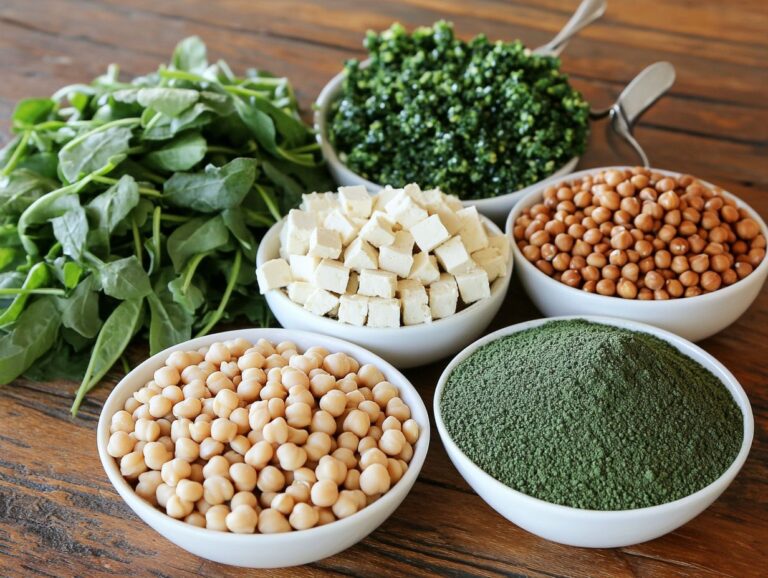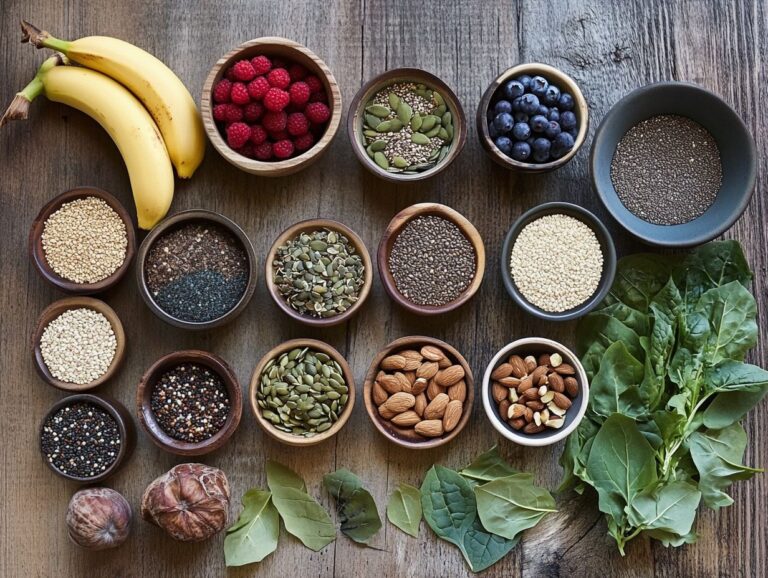Adopting a vegan diet can represent a rewarding endeavor, providing both ethical and environmental advantages, as well as health benefits, including effective weight management. Maintaining weight on a plant-based diet can present unique challenges, such as ensuring adequate protein intake and managing portion control to avoid nutrient deficiencies. This article examines the key factors that influence weight loss on a vegan diet, encompassing aspects such as calorie deficit, balanced macronutrients, and physical activity levels. It offers practical strategies, including optimal protein sources, mindful eating habits, and meal planning tips, ensuring that individuals can achieve their health objectives while enjoying a variety of delicious plant-based foods and managing dietary restrictions.
What is a Vegan Diet?
 A vegan diet represents a plant-based dietary approach that excludes all animal products, emphasizing a diverse range of nutrient-dense foods, including fruits, vegetables, legumes, whole grains, nuts, and seeds, which support metabolic health and reduce the risk of chronic diseases. This lifestyle not only addresses ethical considerations related to animal welfare but also seeks to enhance overall health by providing essential nutrients while minimizing the intake of unhealthy fats and processed foods, ultimately promoting a sustainable lifestyle. As an increasingly popular trend among the U.S. population, veganism is acknowledged for its potential health benefits, which include effective weight management, improved fiber intake, and a reduced risk of chronic diseases such as cardiovascular disease and diabetes mellitus. The core principles of this dietary choice highlight compassion and sustainability, encouraging individuals to consume unprocessed foods that are rich in vitamins, minerals, and antioxidants, crucial for preventing vitamin deficiencies and supporting overall health. It is imperative for those adhering to a vegan diet to be cognizant of nutrient absorption, as certain essential nutrients, including vitamin B12, calcium, iron, and omega-3 fatty acids, may be less accessible from plant sources. Without proper planning, individuals may face risks of vitamin deficiencies and health risks that could lead to complications. Therefore, a balanced approach to nutrition is essential, ensuring the integration of a diverse array of foods to effectively meet dietary needs while embracing the ethical implications of a vegan lifestyle.
A vegan diet represents a plant-based dietary approach that excludes all animal products, emphasizing a diverse range of nutrient-dense foods, including fruits, vegetables, legumes, whole grains, nuts, and seeds, which support metabolic health and reduce the risk of chronic diseases. This lifestyle not only addresses ethical considerations related to animal welfare but also seeks to enhance overall health by providing essential nutrients while minimizing the intake of unhealthy fats and processed foods, ultimately promoting a sustainable lifestyle. As an increasingly popular trend among the U.S. population, veganism is acknowledged for its potential health benefits, which include effective weight management, improved fiber intake, and a reduced risk of chronic diseases such as cardiovascular disease and diabetes mellitus. The core principles of this dietary choice highlight compassion and sustainability, encouraging individuals to consume unprocessed foods that are rich in vitamins, minerals, and antioxidants, crucial for preventing vitamin deficiencies and supporting overall health. It is imperative for those adhering to a vegan diet to be cognizant of nutrient absorption, as certain essential nutrients, including vitamin B12, calcium, iron, and omega-3 fatty acids, may be less accessible from plant sources. Without proper planning, individuals may face risks of vitamin deficiencies and health risks that could lead to complications. Therefore, a balanced approach to nutrition is essential, ensuring the integration of a diverse array of foods to effectively meet dietary needs while embracing the ethical implications of a vegan lifestyle.
Why is Weight Management Important?
Weight management is an essential component of maintaining overall well-being and preventing various health complications, particularly concerning obesity and its associated chronic diseases, such as diabetes mellitus and hypertension. Effective weight management strategies not only promote a healthier lifestyle but also enhance metabolic health by reducing the risk of conditions like cardiovascular disease, thereby contributing to increased longevity and improved quality of life. A balanced approach to achieving and maintaining a healthy weight includes a combination of mindful eating, regular physical activity, cooking methods that support nutritional adequacy, and emotional support. By being aware of dietary restrictions, individuals can make informed choices that align with their nutritional needs, opting for healthy snacks instead of processed alternatives to nourish their bodies, thus supporting their dietary goals and food security. Incorporating exercise into daily routines is also crucial, as even moderate activities, such as walking or cycling, significantly contribute to weight loss, boost metabolic rate, and enhance emotional well-being. When individuals prioritize weight management, they ultimately cultivate a more vibrant and fulfilling lifestyle, allowing for greater engagement in everyday activities.
Factors that Affect Weight on a Vegan Diet
Numerous factors are essential in determining weight outcomes for individuals adhering to a vegan diet, including calorie consumption, nutrient intake, and personal dietary habits. A successful vegan diet necessitates meticulous consideration of macronutrient balance, ensuring sufficient protein intake from plant-based sources such as legumes, tofu, and nuts, while concurrently maintaining a calorie deficit to facilitate weight loss. Furthermore, it is crucial to comprehend the implications of nutrient absorption and to address potential deficiencies, particularly regarding vitamin B12 and calcium, in order to achieve sustainable weight management.
Calorie Consumption and Nutrient Intake
 Calorie consumption and nutrient intake are essential components of an effective vegan diet, significantly impacting weight management and overall health. Maintaining a calorie deficit is critical for weight loss, which requires diligent monitoring of daily calorie intake while prioritizing nutrient-dense whole foods to reduce the risk of nutrient deficiencies. It is imperative to understand how to balance macronutrients proteins, fats, and carbohydrates to promote a well-rounded vegan lifestyle. Selecting a diverse array of plant-based sources, such as legumes, nuts, seeds, and whole grains, not only supports satiety but also ensures sufficient vitamin and mineral intake. Being mindful of portion sizes can assist individuals in reaching their weight loss objectives without experiencing feelings of deprivation. Additionally, emphasizing whole foods, including fresh fruits and vegetables, can enhance nutrient density while naturally constraining calorie intake. This deliberate approach allows individuals to appreciate the culinary diversity of plant-based eating while simultaneously nurturing their health.
Calorie consumption and nutrient intake are essential components of an effective vegan diet, significantly impacting weight management and overall health. Maintaining a calorie deficit is critical for weight loss, which requires diligent monitoring of daily calorie intake while prioritizing nutrient-dense whole foods to reduce the risk of nutrient deficiencies. It is imperative to understand how to balance macronutrients proteins, fats, and carbohydrates to promote a well-rounded vegan lifestyle. Selecting a diverse array of plant-based sources, such as legumes, nuts, seeds, and whole grains, not only supports satiety but also ensures sufficient vitamin and mineral intake. Being mindful of portion sizes can assist individuals in reaching their weight loss objectives without experiencing feelings of deprivation. Additionally, emphasizing whole foods, including fresh fruits and vegetables, can enhance nutrient density while naturally constraining calorie intake. This deliberate approach allows individuals to appreciate the culinary diversity of plant-based eating while simultaneously nurturing their health.
Physical Activity Levels
Physical activity levels play a crucial role in weight management, especially for individuals adhering to a vegan diet. Regular exercise can enhance metabolic rate and contribute to effective weight loss strategies. Incorporating a consistent regimen of physical activity, including resistance training and aerobic exercises, not only aids in achieving weight objectives but also promotes overall metabolic health and fitness. For individuals embracing a plant-based lifestyle, the integration of exercise can significantly amplify the benefits derived from consuming nutrient-dense foods. Activities such as yoga not only enhance flexibility but also assist in stress management, which is essential to prevent weight gain. Cardiovascular exercises, including cycling and dancing, serve as effective means of calorie expenditure while simultaneously supporting cardiovascular health and helping to manage genetic predisposition to weight gain. Strength training is instrumental in building muscle mass and increasing resting metabolic rate, resulting in a higher caloric burn even during periods of rest. By balancing various forms of exercise, such as resistance training and aerobic activities, individuals can adopt a comprehensive approach to health that complements a vegan diet, ultimately leading to sustainable and rewarding outcomes.
Strategies for Maintaining a Healthy Weight on a Vegan Diet
Implementing effective strategies for maintaining a healthy weight on a vegan diet requires a comprehensive approach that includes mindful meal planning, portion control, calorie calculations, and the incorporation of a diverse range of plant-based protein sources and healthy fats. By prioritizing balanced macronutrients and emphasizing whole foods, individuals can successfully attain their dietary objectives while mitigating the risk of nutrient deficiencies and fostering sustainable weight management, even for those with a genetic predisposition to obesity.
Plant-based Protein Sources
 Plant-based protein sources are essential components of a vegan diet, offering a diverse array of options to meet protein intake needs while also fulfilling broader nutrient requirements. Legumes, tofu, nuts, and seeds are all excellent choices that not only provide protein but also contribute healthy fats and essential vitamins, thereby supporting overall health and effective weight management. Incorporating these foods into daily meals can be both straightforward and enjoyable. For example, adding chickpeas to salads or blending them into a smooth hummus can create a delicious and nutritious snack, providing fiber intake and fulfilling dietary goals. Quinoa, recognized as a nutrient-dense grain, serves as an excellent base for grain bowls, allowing for the addition of various vegetables and spices. Considering edamame or tempeh as protein-rich toppings for stir-fries enhances both flavor and protein content, helping to meet nutrient requirements and support a balanced macronutrient profile. To further bolster protein intake, one might consider substituting traditional dairy options with fortified plant-based alternatives, such as almond or oat milk, which can help ensure satisfaction and sustained energy throughout the day, while also supporting dietary goals.
Plant-based protein sources are essential components of a vegan diet, offering a diverse array of options to meet protein intake needs while also fulfilling broader nutrient requirements. Legumes, tofu, nuts, and seeds are all excellent choices that not only provide protein but also contribute healthy fats and essential vitamins, thereby supporting overall health and effective weight management. Incorporating these foods into daily meals can be both straightforward and enjoyable. For example, adding chickpeas to salads or blending them into a smooth hummus can create a delicious and nutritious snack, providing fiber intake and fulfilling dietary goals. Quinoa, recognized as a nutrient-dense grain, serves as an excellent base for grain bowls, allowing for the addition of various vegetables and spices. Considering edamame or tempeh as protein-rich toppings for stir-fries enhances both flavor and protein content, helping to meet nutrient requirements and support a balanced macronutrient profile. To further bolster protein intake, one might consider substituting traditional dairy options with fortified plant-based alternatives, such as almond or oat milk, which can help ensure satisfaction and sustained energy throughout the day, while also supporting dietary goals.
Healthy Fats and Carbohydrates
Incorporating healthy fats and carbohydrates into a vegan diet is essential for achieving balanced macronutrient levels and supporting overall health, as well as enhancing nutrient absorption and reducing health risks. Foods such as avocados, nuts, whole grains, and coconut serve as excellent sources of healthy fats and complex carbohydrates, which provide sustained energy, promote nutrient absorption, and enhance the nutritional density of the diet. The inclusion of these components not only contributes to cardiovascular health by improving cholesterol levels and reducing inflammation but also aids in maintaining stable blood sugar levels. To increase the intake of healthy fats, it is advisable to consider adding chia seeds or flaxseeds to smoothies. Legumes and a variety of vegetables are ideal options for obtaining essential carbohydrates, supporting fiber intake and metabolic health. Meal preparation utilizing quinoa or brown rice as a base, complemented by a dressing rich in olive oil, can effectively ensure that individuals following a plant-based diet meet their nutritional requirements. This deliberate approach fosters a well-rounded diet that supports both physical and mental well-being.
Meal Planning and Portion Control
Effective meal planning and portion control are essential strategies for maintaining a healthy weight within a vegan diet. These practices enable individuals to manage their daily calorie intake while ensuring optimal nutrition and preventing food insecurity. Keeping a food diary can assist in tracking meals and portion sizes, thereby facilitating mindful eating habits, calorie deficit maintenance, and the incorporation of healthy snacks. By engaging in thoughtful meal planning, individuals can develop balanced menus that emphasize whole foods and essential nutrients while minimizing the temptation to indulge in high-calorie or processed items. Proper meal planning can also support weight loss by creating a calorie deficit. Employing portion control techniques, such as measuring servings or utilizing smaller plates, promotes awareness of food quantities, allowing for satisfaction without excessive consumption. Portion control helps maintain a balanced macronutrient intake and supports weight management. Maintaining a food diary not only serves as a record of consumed items but also acts as a valuable tool for identifying patterns and implementing informed changes to improve dietary adherence. This practice also helps monitor daily calorie intake and nutrient requirements. This holistic approach ultimately contributes to enhanced nutritional adequacy and effective weight management, making it more achievable to attain and sustain personal health goals. By focusing on nutrient-dense foods and regular protein intake, individuals can effectively manage their weight.
Additional Tips for Weight Management on a Vegan Diet
 Along with foundational strategies for weight management, several supplementary recommendations can further enhance the success of a vegan diet. These include maintaining proper hydration, managing cravings effectively, and seeking professional guidance when necessary. Incorporating plant-based foods such as legumes and nuts can also support dietary goals. It is also essential to address emotional eating by adopting mindful eating practices, as this is critical for sustaining dietary adherence and achieving desired weight goals. Mindful eating habits can help manage psychological stress and prevent overeating.
Along with foundational strategies for weight management, several supplementary recommendations can further enhance the success of a vegan diet. These include maintaining proper hydration, managing cravings effectively, and seeking professional guidance when necessary. Incorporating plant-based foods such as legumes and nuts can also support dietary goals. It is also essential to address emotional eating by adopting mindful eating practices, as this is critical for sustaining dietary adherence and achieving desired weight goals. Mindful eating habits can help manage psychological stress and prevent overeating.
Staying Hydrated
Maintaining proper hydration is a fundamental component of a healthy lifestyle, particularly for individuals adhering to a vegan diet. Adequate water intake supports nutrient absorption and contributes to various health benefits, including improved metabolic health. Proper hydration can enhance metabolism, facilitate digestion, and effectively manage hunger levels throughout the day. For those following a plant-based lifestyle, it is essential to be cognizant of water consumption. While many fruits and vegetables that are staples in a vegan diet possess high water content, they may not always sufficiently meet hydration needs. Including hydrating foods like cucumbers, oranges, and leafy greens can help. Incorporating a diverse range of hydrating foods, such as cucumbers, oranges, and leafy greens, can play a critical role in achieving the recommended water intake levels. Additionally, establishing reminders to drink water consistently throughout the day and opting for herbal teas can further enhance hydration. Proper hydration supports cardiovascular health and can mitigate risks associated with chronic diseases. Ultimately, maintaining adequate hydration is crucial for improving nutrient uptake from plant sources, thereby facilitating effective weight management and promoting optimal health. Adequate hydration also aids in managing calorie calculations and enhancing metabolic rate.
Managing Cravings and Emotional Eating
Managing cravings and emotional eating is critical for effective weight management on a vegan diet, as these factors can profoundly influence dietary habits and overall health. Developing mindful eating practices and selecting healthy snacks can help alleviate impulsive eating behaviors, fostering a more balanced relationship with food. This approach is particularly important for managing obesity and other diet-related health risks. By being attentive to hunger cues and emotional triggers, individuals can differentiate between genuine hunger and emotional responses, enabling more intentional decision-making at mealtimes. This attentiveness can help mitigate the impact of genetic predispositions and other factors contributing to unhealthy eating behaviors. Incorporating a diverse range of nutrient-dense, vegan-friendly snacks, such as fruits and vegetables, legumes, and nuts, can effectively satisfy cravings without compromising dietary objectives.
- Fresh fruits, including those high in fiber intake like apples and berries
- Raw vegetables
- Nut-based energy balls
can effectively satisfy cravings without compromising dietary objectives. Practicing mindful eating such as taking the time to savor each bite or reflecting on the origin of the food can enhance satisfaction and help prevent overeating. Embracing this holistic approach not only supports weight management but also encourages a deeper appreciation for nourishing the body in a compassionate manner. Mindful eating can also reduce the risk of developing diet-related chronic diseases.
Seeking Professional Guidance
Seeking professional guidance is an invaluable resource for individuals pursuing weight management while adhering to a vegan diet. Nutritionists and dietitians can offer personalized advice that aligns with specific dietary goals and health needs. This support is essential in addressing potential health risks, nutrient deficiencies, and vitamin deficiencies, thereby ensuring a balanced and sustainable approach to nutrition. By collaborating closely with these healthcare experts, individuals can gain valuable insights into specific nutrients that may be lacking in a plant-based diet, such as vitamin B12, iron, calcium, and omega-3 fatty acids. This collaborative approach facilitates the development of a customized meal plan that takes into account personal preferences, lifestyle, and health status. Including protein sources like tofu, almonds, and coconut can help meet dietary needs. Healthcare professionals play a critical role in setting realistic goals, monitoring progress, and adjusting dietary recommendations as necessary. This not only enhances the likelihood of achieving desired outcomes but also gives individuals the power to make informed choices that promote their health and overall well-being, thereby reducing the risk of chronic conditions associated with inadequate nutrition. Engaging in regular exercise, including resistance training, can further support these health objectives.





